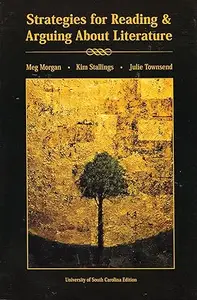- Témaindító
- #1
- Csatlakozás
- 2024.09.10.
- Üzenetek
- 25,854
- Reakció pontszám
- 8
- Díjak
- 5
- Kor
- 37

Free Download Kim Stallings, Julie Townsend, "Strategies for Reading and Arguing About Literature"
English | 2007 | pages: 337 | ISBN: 0536346216 | PDF | 151,5 mb
From Francie Quaas-Berryman, " [The authors] break down the reading and writing process into manageable chunks that would be very easy for students to work through. The guidelines for writing and the reading questions would be an excellent way to develop class discussions on the literary selections and help the students begin to process their ideas for writing assignments. I haven't taught this course in a while because I have been frustrated by the lack of materials. If this text was available, I would add the course back to my schedule request again." From MattTurnerCy-FairCollege "[Strategies for Reading and Arguing about Literature]provides one of the most in-depth and comprehensive discussions of argument and its connection to literature that I've found...The argumentation here is the strongest I've found so far in literary anthologies...This book provides a substantial (and substantive) integration of argument. " Strategies for Reading and Arguing about Literature teaches the art of academic argumentation through a focus on classic and contemporary literature. This four-genre text focuses on argumentation and the writing process in depth by taking a twofold approach. The first approach encourages turning in to the text and creating arguments using the primary text alone while the second encourages turning out from the text and using various literary theories and secondary texts to create arguments. The book's philosophy is demonstrated in its five distinct Part 1 is an introduction to argument and arguing about literature with a focus on the Toulmin philosophy.Part 2 focuses on reading strategies and includes a repertoire of critical reading tools to understand literary texts.Part 3 incorporates traditional literary theory as a tool for exploring and generating arguments about literature. Part 4 guides students through the writing process and includes an extensive section of MLA documentation instruction and examples. Part 5 contains the anthology and is arranged in five thematic casebooks with five mini-author casebooks.
Buy Premium From My Links To Get Resumable Support,Max Speed & Support Me
Code:
⚠
A kód megtekintéséhez jelentkezz be.
Please log in to view the code.
